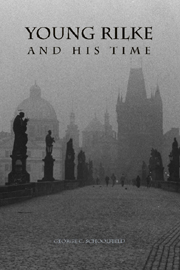1 - Vally, Hidigeigei, and Others
from I - Prague
Published online by Cambridge University Press: 05 February 2013
Summary
The tale of René Rilke's vicissitudes, as a child and adolescent, has often been told: his cosseting by his mother, his attendance, often interrupted by illnesses, at Prague's Piarists' School, his parents' marital troubles and divorce, his enrollment in the junior military school at Sankt Pölten, where he spent four years, his advancement to the upper and more rigorous academy at Mährisch-Weißkirchen (a catastrophe, with long spells in the infirmary), and then his eight months at the commercial institute in Linz, where he appears to have led a mildly dissolute life.
From Muzot, on 18 December 1925, in a famous postscript, he told Arthur Fischer-Colbrie, an inquisitive Linz poet: “In Linz könnte freilich niemand über mich ‘Auskünfte’ geben: die unglücklichen, dort verbrachten Monate fassen eine Zeit zusammen, da ich mir selber ganz unkenntlich war: wie sehr muß ichs erst den Anderen gewesen sein!” (GB 5:389; In Linz, of course, no one could supply information about me: the unhappy months I spent there constitute a time when I was quite unrecognizable to myself: how much [more] then, I must have been that to others!). After his flight to Vienna with the nanny, Olga Blumauer, it was plainly a question of what to do with the troubled youth next.
His paternal uncle Jaroslav Rilke (1833–92) devised a plan — to submit René, going on seventeen, to a program of rigorous cramming, in order to make up for the classical-gymnasium education he had missed in his half-a-decade as a cadet.
- Type
- Chapter
- Information
- Young Rilke and his Time , pp. 3 - 48Publisher: Boydell & BrewerPrint publication year: 2008



